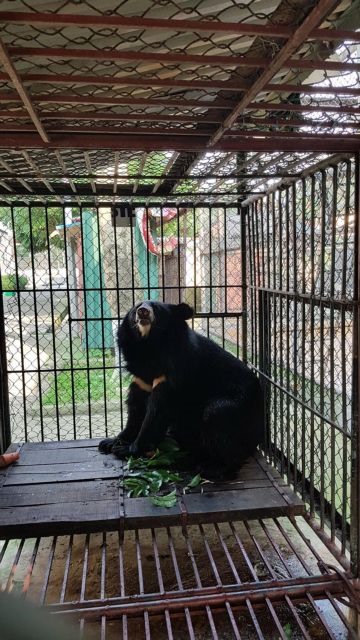 Environment
Environment

A group of organisations on Monday proposed some solutions to Hà Nội authorities for the protection of bears from exploitation in the capital.

|
A group of organisations have suggested ways to further protect bears in Việt Nam. — Photo courtesy of Education for Nature - Vietnam
HÀ NỘI — A group of organisations on Monday proposed some solutions to Hà Nội authorities for the protection of bears from exploitation in the capital.
In 2005, Việt Nam made the extraction and sale of bear bile illegal. As the bears on farms were domesticated and unsuitable to be released back into the wild, farmers were allowed to keep their farms open, as long as the bears were microchipped for monitoring and had been registered before 2005.
While the illegal trade of bear bile still continues, reduced demand has driven down prices and many bears have died from neglect or ill health.
Hà Nội is the largest bear breeding hotspot in Việt Nam with 149 bears being kept in private facilities, accounting for 51 per cent of the total number of bears bred in cages in the country, according to Education for Nature-Vietnam (ENV).
Phúc Thọ District in the capital currently has 139 bears in personal facilities, accounting for 93 per cent of the total number of bears in Hà Nội.
ENV Deputy Director Bùi Thị Hà said: “It is time for the capital to take drastic measures to soon close bear breeding facilities in the area in order to end the cruel and illegal breeding of bears for bile.”
The solutions suggested include strengthening the inspection and management of bear breeding facilities; firmly dealing with violations; confiscating bears in illegal captivity at facilities; and strictly handling according to law provisions for serious violations.
Gilbert Sape, Global Head of Wildlife Campaign, World Animal Protection, said that since 2005, World Animal Protection has worked closely with the Vietnamese Government and authorities, as well as a group of organisations to protect bears in Việt Nam, with the goal of ending the bear breeding industry.
“Ending bear breeding in Hà Nội is an important step towards ending the bear industry in the country.”
The group also called for the prohibition of breeding bears in private facilities; encouraging owners to voluntarily hand over bears to the Government and strictly ensuring the policy of "no compensation" to owners in all cases, as well as encouraging the use of herbs instead of bear bile.
Many bear rescue centres, including FOUR PAWS Bear Conservancy in Ninh Bình Province, an international standard facility, have been built to give new life to bears that were once kept in cages, in a semi-wild environment. — VNS




